
Hannah and Her Sisters is a 1986 American comedy-drama film written and directed by Woody Allen. It tells the intertwined stories of an extended family over two years that begins and ends with a family Thanksgiving dinner. Allen also stars in the film, along with Mia Farrow as Hannah, Michael Caine as her husband, and Barbara Hershey and Dianne Wiest as her sisters. Alongside them, the film features a large ensemble cast.

Sweet and Lowdown is a 1999 American comedy-drama mockumentary written and directed by Woody Allen. Loosely based on Federico Fellini's film La Strada, the film tells the story of jazz guitarist Emmet Ray who falls in love with mute laundress Hattie. Like several of Allen's other films, the film is occasionally interrupted by interviews with critics and biographers like Allen, Nat Hentoff, Daniel Okrent, and Douglas McGrath, who comment on the film's plot as if the characters were real-life people.

Zelig is a 1983 American satirical mockumentary comedy film written, directed by and starring Woody Allen as Leonard Zelig, a nondescript enigma, who, apparently out of his desire to fit in and be liked, unwittingly takes on the characteristics of strong personalities around him. The film, presented as a documentary, recounts his period of intense celebrity during the 1920s, including analyses by contemporary intellectuals.
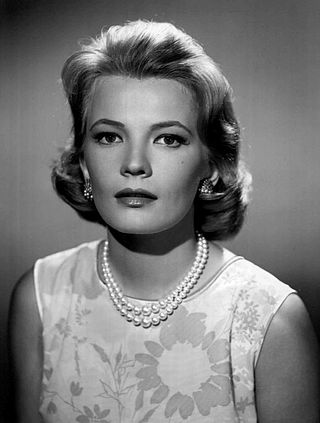
Virginia Cathryn "Gena" Rowlands is an American retired actress, whose career in film, stage, and television has spanned nearly seven decades. A four-time Emmy and two-time Golden Globe winner, she is known for her collaborations with her actor-director husband John Cassavetes in ten films, including A Woman Under the Influence (1974) and Gloria (1980), both of which earned her nominations for the Academy Award for Best Actress. She also won the Silver Bear for Best Actress for Opening Night (1977). She is also known for her performances in Woody Allen's Another Woman (1988), and her son Nick Cassavetes's film, The Notebook (2004). In 2021, Richard Brody of The New Yorker said, “The most important and original movie actor of the past half century-plus is Gena Rowlands.” In November 2015, Rowlands received an Honorary Academy Award in recognition of her unique screen performances.

Interiors is a 1978 American drama film written and directed by Woody Allen. It stars Kristin Griffith, Mary Beth Hurt, Richard Jordan, Diane Keaton, E. G. Marshall, Geraldine Page, Maureen Stapleton, and Sam Waterston.
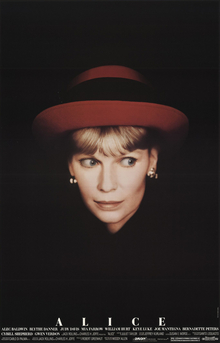
Alice is a 1990 American fantasy romantic comedy film written and directed by Woody Allen and starring Mia Farrow, Joe Mantegna, and William Hurt. The film is a loose reworking of Federico Fellini's 1965 film Juliet of the Spirits.

Hollywood Ending is a 2002 American comedy film written and directed by Woody Allen, who also plays the principal character. It tells the story of a once-famous film director who suffers hysterical blindness due to the intense pressure of directing.

Anything Else is a 2003 American romantic comedy film written and directed by Woody Allen, produced by Letty Aronson, and starring Allen, Jason Biggs, Stockard Channing, Danny DeVito, Jimmy Fallon, and Christina Ricci. The film premiered as the opening night selection of the 60th Venice International Film Festival. It was released theatrically in the United States on September 19, 2003, to mixed reviews.

Husbands and Wives is a 1992 American comedy-drama film written and directed by Woody Allen. The film stars Allen, Mia Farrow, Sydney Pollack, Judy Davis, Lysette Anthony, Juliette Lewis, Liam Neeson and Blythe Danner. The film debuted shortly after the end of Allen and Farrow's romantic and professional partnership, and was the last of their 13 films together. The movie is filmed by Carlo Di Palma with a handheld camera style and features documentary-like interviews with the characters interspersed with the story.
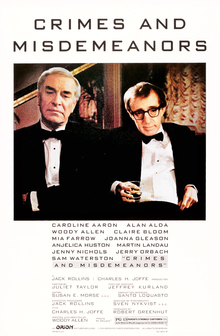
Crimes and Misdemeanors is a 1989 American existential comedy-drama film written and directed by Woody Allen, who stars alongside Martin Landau, Mia Farrow, Anjelica Huston, Jerry Orbach, Alan Alda, Sam Waterston, and Joanna Gleason.
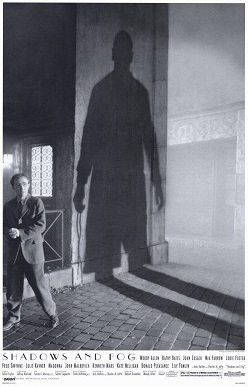
Shadows and Fog is a 1991 American black-and-white comedy film directed by Woody Allen and based on his one-act play Death (1975). It stars Allen, Mia Farrow, John Malkovich, Kathy Bates, David Ogden Stiers, Jodie Foster, Donald Pleasence, Lily Tomlin, John Cusack, Madonna, and Kenneth Mars. It was filmed on a 26,000-square-foot (2,400 m2) set at Kaufman Astoria Studios, which was the biggest set ever built in New York. It was also Allen's last film for Orion Pictures.
The Gymnopédies, or Trois Gymnopédies, are three piano compositions written by French composer and pianist Erik Satie. He completed the whole set by 2 April 1888, but they were at first published individually: the first and the third in 1888, the second in 1895.

Classical Baby is an American animated television series for young children and families directed by Amy Schatz and produced by HBO. The animation was created and designed by Maciek Albrecht and MaGiK World Animation. Classical Baby is designed to introduce young children to masterpieces from the worlds of music, art, dance, and poetry. This series first aired on HBO Family on May 14, 2005.
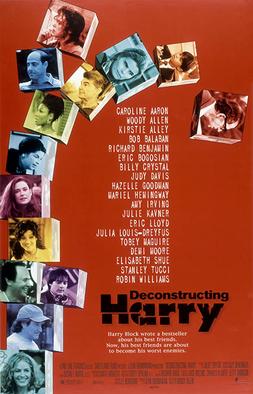
Deconstructing Harry is a 1997 American black comedy film written, directed by, and co-starring Woody Allen, with an ensemble cast, including Caroline Aaron, Kirstie Alley, Bob Balaban, Richard Benjamin, Eric Bogosian, Billy Crystal and Judy Davis, as well as Jennifer Garner in her feature film debut. The film tells the story of a successful writer named Harry Block, played by Allen, who draws inspiration from people who he knows in real life, and from events that happen to him, sometimes causing these people to become alienated from him as a result.
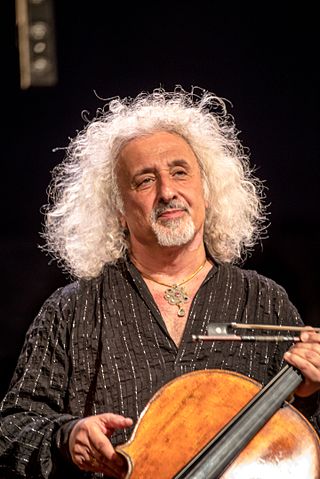
Mischa Maisky is a Soviet-born Israeli cellist.
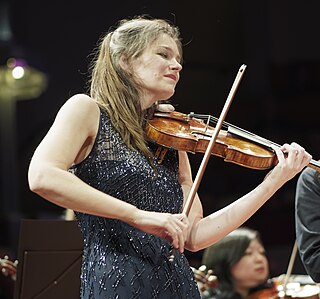
Janine Jansen is a Dutch violinist and violist.

Scoop is a 2006 romantic crime comedy film written and directed by Woody Allen and starring Hugh Jackman, Scarlett Johansson, Ian McShane and Allen himself. It was released in the United States by Focus Features on July 28, 2006. The film follows an American journalist and a magician being guided by the spirit of a reporter to investigate a British aristocrat who might be a serial killer. Scoop received mixed reviews from critics regarding its humor, but was a box-office success, grossing $39.2 million against a $4 million budget.
Lily Maisky is a classical pianist. She is the daughter of cellist Mischa Maisky.
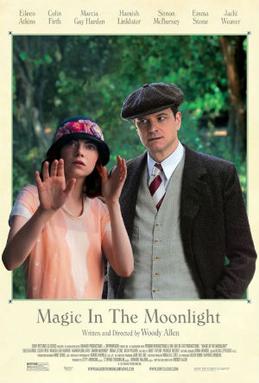
Magic in the Moonlight is a 2014 romantic comedy film written and directed by Woody Allen. The film stars Eileen Atkins, Colin Firth, Marcia Gay Harden, Hamish Linklater, Emma Stone, Simon McBurney, and Jacki Weaver. Set in the 1920s on the French Riviera, the film was released in the United States on July 25, 2014, by Sony Pictures Classics. Magic in the Moonlight received a mixed reception. Critics praised the performances of Firth and Stone, but found the film's writing formulaic.

















